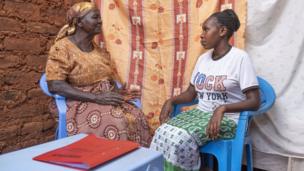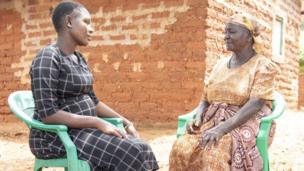I would not have kept the baby': Fighting depression in pregnancy
About 450 million people worldwide currently suffer from a mental health condition, making it one of the leading causes of ill health. Could it be that others within their community hold the key to help solve this problem?
People in high-income countries often face a lack of mental health services, but in middle and low-income countries the scale of the problem can be much worse.
Millions with conditions like depression, anxiety and schizophrenia struggle to get treatment due to lack of resources and the stigmatisation of mental health problems.
Pregnant women are a particularly at-risk group.
In Kenya, for example, symptoms of depression such as fatigue and sleep problems are sometimes dismissed as purely symptoms of pregnancy, or even blamed on witchcraft.
This lack of medical attention, combined withhigh rates of domestic violence contributed to a 0.5% maternal mortality rate in 2015, one of the highest in the world.
Depression in pregnancy is also associated with low birth weight, maltreatment and problems breastfeeding.
 AFRICAN ACADEMY OF SCIENCES
AFRICAN ACADEMY OF SCIENCESOne million people without a psychiatrist
Kenya has only two mental health professionals for every 100,000 people, and they are concentrated in urban areas. This means some rural counties have a population of millions, but no psychiatrists.
An estimated 75% of people with mental health conditions in poorer countries can't access medical treatment. This means many to turn tonon-specialist traditional healers, faith healers and community health workers instead.
We discovered that training these groups to screen for mental health conditions could drastically reduce the number of people who can't access treatment.
Building on these findings, traditional birth attendants were trained to screen for depression in more than 1,700 pregnant women in a pilot study by the Africa Mental Health Research and Training Foundation.
The study took place in Makueni County, a largely rural part of south-eastern Kenya. One of the country's poorest counties, it has no resident psychologists.
 GETTY IMAGES
GETTY IMAGESWho are traditional birth attendants?
- Birth attendants are often the first point of contact for pregnant women in rural Africa
- While not medically trained, they perform a similar role to midwives
- Learning through apprenticeships, they usually receive money or payments in kind from the woman's family
- As well as delivering the baby, birth attendants reassure women and help them prepare for becoming a mother, while trying to reduce family conflict.
- The birth attendants used the Edinburgh Postnatal Depression Scale questionnaire and then a WHO mental health intervention guide, both of which are designed for use outside of clinics and hospitals
Domestic violence
The results of the screening were striking.
A quarter of the mothers in the study were found to have mild to moderate depression. Three-quarters had experienced intimate partner violence, whether physical, sexual or emotional abuse, or controlling behaviour. Half are victims of at least two forms of this violence.
Nearly 60% of the mothers diagnosed with depression received treatment from their birth attendant based on a World Health Organization programme designed for use by non-specialists.
 AFRICAN ACADEMY OF SCIENCES
AFRICAN ACADEMY OF SCIENCES
The mothers were 26 years old on average, with almost half aged between 12 and 24.
One young mother involved in the study, Ndanu*, was diagnosed with depression.
She said: "If it were not for this programme and the help of a birth attendant, I would not have kept this baby to term and perhaps not gone for all the antenatal visits.
"The birth attendant counselled me, encouraged me to keep the baby by telling me that it was not my fault and children are a blessing and that I should visit the health centre for antenatal care. She promised to check on me and opened her house for me to talk to her whenever I wanted"
 AFRICAN ACADEMY OF SCIENCES
AFRICAN ACADEMY OF SCIENCES
Birth attendants intervened by talking through problems, involving supportive family members, and flagging any signs of mistreatment.
They encouraged depressed mothers to exercise and maintain a regular sleep cycle, rebuild their social networks and resume activities which they'd previously enjoyed. The mothers were also given the opportunity to take part in community activities and join support groups.
Mueni*, a birth attendant taking part in the study, said: "A pregnant mother opens up to us and we try to understand the reasons for her depression, we solve the issues through guidance and counselling. If the issue is rooted on her parents or her spouse, we engage them and we reach an agreement."
Mothers who received the treatment saw their depressive symptoms fall by 55% at the end of three months, compared to 26% of those who didn't have a specific intervention.
Discreet mental health services
These early findings suggest training birth attendants in mental healthcare could improve the wellbeing of mothers and their children, not just in Kenya but in any countries where similar community health workers operate.
Birth attendants are usually accessible and have a good relationship with their patients, meaning they are well placed to offer low-cost, discreet mental health services.
Training up more psychiatrists would be helpful, but this takes a lot of time and funding.
Birth attendants could bridge the gap by offering an accessible, acceptable level of basic mental health care in under-resourced areas, while still providing a link between healthcare professionals and pregnant mothers.

Comments
Post a Comment